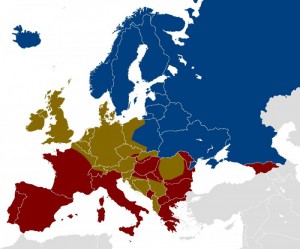- Rebuilding Haiti’s agriculture on the back of diverse tissue-cultured banana plantlets.
- Rhizowen’s hidden talets. And no, that’s not a misprint.
- “The age long drink, also known as BKT, serves as a source of alcohol for those who lack the financial means to patronise refined brew like beer and other foreign or imported drinks.” Count me in.
- Citrus diversity — is the genetic blueprint the only way to enjoy it?
- The collapse of wild-caught fish. In brief.
Witnesses to agricultural adaptation

I think we may have already blogged about WWF’s Climate Witness programme, and if not we should have. It’s a very “effective way to illustrate the impacts of climate change on real people in many different locations around the world, and the action they are taking to address the issues.” Several of the stories involve agriculture, of course. For example, Joseph Kones from Bomet in Kenya says that drought has been increasing in his area over the past 20 years, and that his farm is part of a pilot adaptation project involving tree planting and the building of terraces. It would be nice to extract all the agrobiodiversity-relevant examples of changes and adaptation to them. Perhaps a job for the Platform on Agrobiodiversity Research? Which incidentally we have just added to our blogroll. See what I did there?
Nibbles: Vet, Pastoralists, Eggplant, US food map, Mexican food, Poultry, Maize, GMOs
- What’s it like being the only vet in a country? The BBC tells us.
- The CBD on how to be a good pastoralist.
- James does a mini-roundup of the India GM brinjal to-do.
- Mapping the fast food culture.
- Mexico wants Unesco to recognize culinary traditions. As if tamales were in danger of extinction. Didn’t France ask for the same last year?
- Heirloom chickens don’t taste like chicken.
- Deconstructing the cultural significance of the colour of corn.
- “GM crops: still not a panacea for poor farmers.” In other news, still no cure for cancer.
Mapping European alcoholic diversity
A map over at Strange Maps seems to suggest that the most diverse place in Europe in terms of drinks traditions is the area where Hungary, Romania and Ukraine — and thus the wine, beer and vodka belts — meet. Check it out:
But is it true? Have any of our readers been there? And can they recall anything about the visit?
Nibbles: Spud, Mali’s farmers, Pollan, Geneflow, Taiwan botanic garden, Pollinators squared, Vegetarianism
- A makeover for the potato.
- Mali’s farmers want improved landraces, not fancy-shmancy hybrids.
- Biofortified does Pollan. And Pollan does Oprah…
- The long-term consequences of introducing new genes to populations are not all that bad. Relevance for crop wild relatives? More research needed…
- The Dr. Cecilia Koo Botanic Conservation Center (KBCC) in Taiwan described.
- Almond tree produces poison in nectar to attract insects? Go figure. In other pollinator news, they’re declining in Central Europe.
- What would a world without domesticated livestock look like? ILRI DG questions vegetarians.
